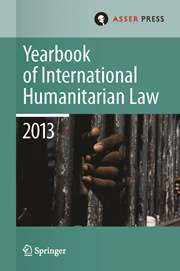Article contents
MORAL AMBIGUITIES UNDERLYING THE LAWS OF ARMED CONFLICT: A PERSPECTIVE FROM MILITARY ETHICS
Published online by Cambridge University Press: 02 February 2010
Abstract
The law of armed conflict suffers from an internal ambiguity. The Declaration of St Petersburg (1868) made the ambiguity explicit when it stated that ‘the necessities of war ought to yield to the requirements of humanity’. The Lieber Code (1863) was less explicit, though it suffered from the same ambiguity. The Code received a lengthy critique from the Confederate Secretary of War who stated bluntly: ‘A military commander under this code may pursue a line of conduct in accordance with the principles of justice, faith and honour, or he may justify conduct correspondent with warfare of the barbarous hordes who overran the Roman Empire, or who, in the Middle Ages, devastated the continent of and menaced the civilisation of Europe’. Which of the two considerations, the Confederate Secretary demanded to know, should prevail: humanity or necessity?
- Type
- Articles
- Information
- Copyright
- Copyright © T.M.C. Asser Instituut and the Authors 2008
- 2
- Cited by




